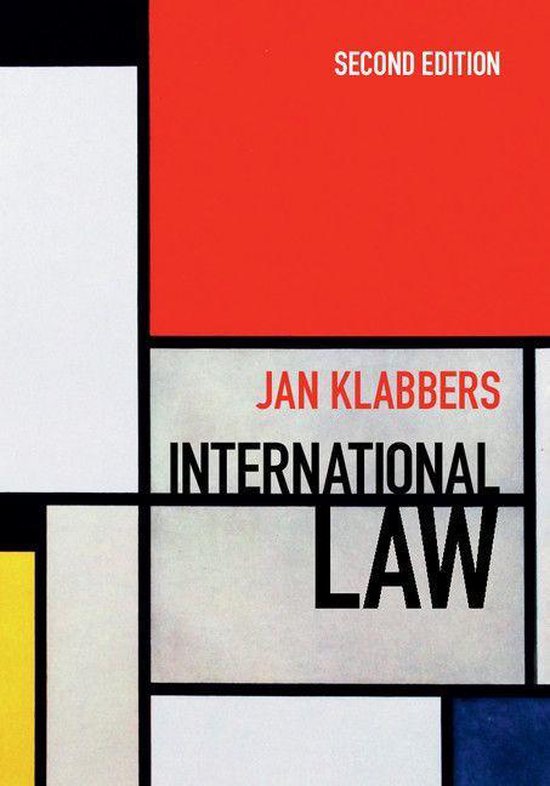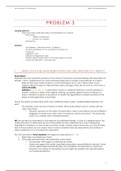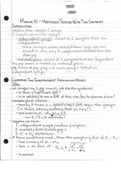Reservations & Declarations Public International Law
PROBLEM 3
Learning objective:
1. When can states make reservations and declarations to a treaty?
- Reservations
o Object and purpose
o Revision on a regime
- Declarations
Literature:
- Jan Klabbers, ‘International Law’, Chapter 3
- UN Treaty Handbook 12-19, accessible via E-lesson 22
- E-lesson 22
- Legislation: VCLT
- Gabcikovo-Nagymaros-case
- Advisory Opinion Reservations to the Genocide Convention
- Armed Activities DRC v. Rwanda-case
1 WHEN CAN STATES MAKE RESERVATIONS AND DECLARATIONS TO A TREATY?
Reservations
Arguably the most important provisions of the Vienna Convention are those dealing with reservations to
treaties – that is, unilateral acts by which individual states wish to modify or exclude part of a treaty.
- Relevant because it allows states to commit themselves at no cost; it allows them to join
regimes without having to make dramatic policy changes if they do not want to, and is thus a
tool for flexibility
- Definition (art. 2(1)(d) VCLT): reservations means a unilateral statement, however phrased or
named, made by a State, when signing, ratifying, accepting, approving or acceding to a
treaty, whereby it purports to exclude or to modify the legal effect of certain provisions of the
treaty in their application to that State
Due to the system of reservations within one multilateral treaty system, multiple bilateral relations can
exist.
- For example, when we have a treaty on trade, all the state parties have to comply with the
rules of the treaty.
o However, because of the system of reservations, state A and state B can have different
obligations towards each other, than, for instance, state B and state C. This eventually
results in a complex web of bilateral relations.
NB: the doctrine on reservations is only relevant to multilateral treaties. In case of a bilateral treaty, the
putting forward of a reservation by one of the parties can be understood as a way of reopening
negotiations. Therefore, in other to see what kind of rules a certain state is bound by you cannot simply
look at the provisions, but you always have to look at whether there are reservations and whether a
state is objected to it or accepted the reservation.
The VCLT provides of three situations with regard to reservations (art. 19):
1. Reservation is prohibited by treaty
2. Only particular reservations are permissible under treaty
o For example: with regard to jurisdictional matters
o States may agree that certain (specified) reservations are prohibited or allowed. Some
human rights treaties specifically allow for a prohibition of reservations to particular
provisions. The nature of international human rights law explains the rationale behind
such partial prohibitions.
1
PROBLEM 3
Learning objective:
1. When can states make reservations and declarations to a treaty?
- Reservations
o Object and purpose
o Revision on a regime
- Declarations
Literature:
- Jan Klabbers, ‘International Law’, Chapter 3
- UN Treaty Handbook 12-19, accessible via E-lesson 22
- E-lesson 22
- Legislation: VCLT
- Gabcikovo-Nagymaros-case
- Advisory Opinion Reservations to the Genocide Convention
- Armed Activities DRC v. Rwanda-case
1 WHEN CAN STATES MAKE RESERVATIONS AND DECLARATIONS TO A TREATY?
Reservations
Arguably the most important provisions of the Vienna Convention are those dealing with reservations to
treaties – that is, unilateral acts by which individual states wish to modify or exclude part of a treaty.
- Relevant because it allows states to commit themselves at no cost; it allows them to join
regimes without having to make dramatic policy changes if they do not want to, and is thus a
tool for flexibility
- Definition (art. 2(1)(d) VCLT): reservations means a unilateral statement, however phrased or
named, made by a State, when signing, ratifying, accepting, approving or acceding to a
treaty, whereby it purports to exclude or to modify the legal effect of certain provisions of the
treaty in their application to that State
Due to the system of reservations within one multilateral treaty system, multiple bilateral relations can
exist.
- For example, when we have a treaty on trade, all the state parties have to comply with the
rules of the treaty.
o However, because of the system of reservations, state A and state B can have different
obligations towards each other, than, for instance, state B and state C. This eventually
results in a complex web of bilateral relations.
NB: the doctrine on reservations is only relevant to multilateral treaties. In case of a bilateral treaty, the
putting forward of a reservation by one of the parties can be understood as a way of reopening
negotiations. Therefore, in other to see what kind of rules a certain state is bound by you cannot simply
look at the provisions, but you always have to look at whether there are reservations and whether a
state is objected to it or accepted the reservation.
The VCLT provides of three situations with regard to reservations (art. 19):
1. Reservation is prohibited by treaty
2. Only particular reservations are permissible under treaty
o For example: with regard to jurisdictional matters
o States may agree that certain (specified) reservations are prohibited or allowed. Some
human rights treaties specifically allow for a prohibition of reservations to particular
provisions. The nature of international human rights law explains the rationale behind
such partial prohibitions.
1







